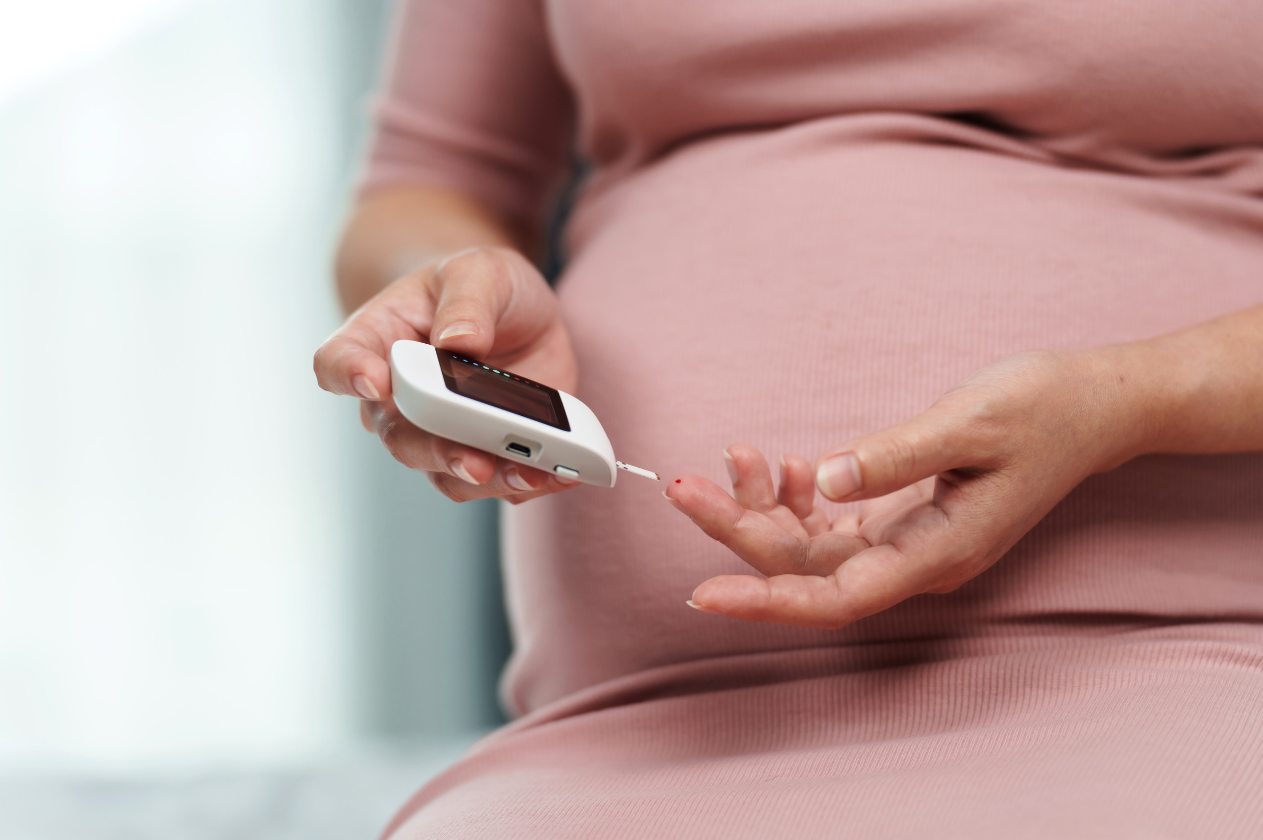If you’ve been diagnosed with gestational diabetes (GDM) and suddenly find yourself not gaining weight in the third trimester, don’t panic. Weight gain and pregnancy is a complex and individualized journey. In fact, I usually recommend that most pregnant individuals avoid the scale altogether, unless there are specific high-risk factors involved. Let’s talk about why.
Table of Contents
The History of Routine Weighing in Pregnancy
The practice of routine weighing during pregnancy can be traced back to World War I when concerns about malnutrition were widespread. It was an attempt to ensure that expectant mothers were receiving adequate nutrition. Over time, this practice became the norm, and it wasn’t until the 1990s that people started worrying about individuals gaining “too much” weight during pregnancy.
Focus on weight loss or weight gain and pregnancy too closely can actually be harmful to the pregnant person, especially if you have a history of disordered eating, eating disorders, or poor body image. This is why I encourage all pregnancy folks to take some time to assess the pros and cons of knowing your weight in pregnancy. It may be best for you to do “blind weights”, where you don’t look at the scale and the provider doesn’t tell you the number, or even tell your doctor you don’t want to be weighed unless it’s medically necessary. The number on the scale can cause undue stress, which isn’t good for you or your blood sugar!
Weight Gain and Pregnancy Can Vary
The truth is, weight gain and pregnancy varies significantly from person to person and even from one pregnancy to another for the same individual. There is not a set amount of weight that you have to gain or not gain to ensure you have a healthy pregnancy. In the same ways that body sizes and shapes vary, so do pregnancy bodies.
Furthermore, research has shown that routine weighing doesn’t necessarily influence the amount of weight gained during pregnancy. So, why do we persist in doing something that may not even make a significant impact and could potentially cause harm due to unnecessary fear and stress? I encourage you to focus more on how you feel, rather than your weight. This will allow you to feel more connected to your body and can help you notice other concerns or feelings that may pop up in pregnancy.
Gestational Diabetes and Weight Gain
If you’ve been diagnosed with gestational diabetes and have noticed that your weight gain has stalled after the diagnosis or in the third trimester, there could be several reasons for this:
- Not Eating Enough: It’s possible that you’ve unintentionally restricted your calorie intake in an effort to manage your blood sugar levels. It’s crucial to balance blood sugar, but it’s equally important to ensure you and your baby are getting the necessary nutrients.
- Earlier Weight Gain: Sometimes, individuals gain weight more rapidly in the earlier stages of pregnancy, and their rate of weight gain naturally evens out as the pregnancy progresses. This can be entirely normal.
- Limited Stomach Space: As your baby grows, there’s less room in your stomach for large meals. This might mean that you need to adjust the quantity and frequency of your meals to accommodate your changing body.
- Heartburn: The discomfort of heartburn can affect when, what, and how much you eat. If heartburn is impacting your eating patterns, it’s essential to find ways to manage it effectively.
If your weight gain has stalled, take some time to evaluate your current relationship with food and how you’ve been feeling in your body. Sometimes taking a day or two to be more cognizant of what you’re experiencing in your body can make all the difference. For example, may you notice that heartburn in the evenings has been causing you to eat less at dinner, or you think back to your first trimester weight gain and realize that may be why you’ve gained less recently.
When to Seek Care or Consider Other Factors
While fluctuations in weight gain and pregnancy are common, there are instances where it’s essential to seek care or consider other factors:

- Significant Weight Loss: If you’re consistently losing weight in the third trimester or experiencing rapid, unexplained weight loss at any point, it’s crucial to consult with your healthcare provider. This could be a sign of an underlying issue.
- Swelling: While some swelling is normal during pregnancy, sudden and severe swelling, especially in the hands and face, can be a sign of preeclampsia, a serious condition that requires immediate medical attention.
- Extreme Changes in Eating Habits: If you find yourself drastically changing your eating habits or struggling with disordered eating patterns during pregnancy, it’s essential to seek support from a healthcare provider or mental health professional. This can help you maintain a healthy relationship with food during pregnancy and beyond.
- Persistent Symptoms: If you experience persistent symptoms such as severe nausea, vomiting, or diarrhea that are impacting your ability to eat and stay nourished, consult your healthcare provider. They can provide guidance and potential treatment options.
Intuitive Eating During Pregnancy
If you are wondering how to nourish and care for your body during pregnancy in a world that’s obsessed with diets and body size, one approach to consider is intuitive eating. Intuitive eating is a philosophy that encourages you to trust your body’s signals of hunger and fullness and make food choices that honor your physical and emotional needs.
In the context of gestational diabetes, it’s crucial to focus on nourishing your body and your baby while managing your blood sugar levels. Intuitive eating aligns perfectly with this goal because it empowers you to:
- Listen to Your Body: Pay close attention to your body’s hunger and fullness cues. Eat when you’re hungry and stop when you’re satisfied. There are also times when it’s okay to eat when you aren’t physically hungry, or to eat past fullness. Intuitive eating isn’t meant to be another diet or set of rules to follow, and there will always be nuance when it comes to food and eating. If you don’t know where to start, learn more about how to honor your hunger here.
- Choose Nutrient-Dense Foods: Opt for foods that provide essential nutrients for you and your baby. Focus on a balanced diet that includes fruits, vegetables, lean proteins, whole grains, and healthy fats. Gentle nutrition is the tenth principle of intuitive eating, and is a great framework to use when adding foods for nourishment to the foods that you love and enjoy! Learn more here.
- Manage Cravings Mindfully: It’s entirely normal to have food cravings during pregnancy. Intuitive eating encourages you to explore and satisfy these cravings in moderation while staying mindful of your overall nutrition. Learn more about how to eat mindfully and stop eating past fullness here.
- Embrace Gentle Nutrition: Rather than rigid dietary rules, intuitive eating promotes gentle nutrition. This means making food choices that are both nourishing and enjoyable without guilt or restriction. Again, learn more about gentle nutrition for pregnancy here.
Learn more about intuitive eating and gestational diabetes here.
TLDR:
Remember, every pregnancy is unique, and there’s no one-size-fits-all approach or standard when it comes to weight gain and pregnancy. If you have concerns about your weight or your gestational diabetes management, don’t hesitate to reach out to your healthcare provider or a registered dietitian who specializes in gestational diabetes.
The most important thing is to prioritize your health and the health of your baby, and that includes finding a balance that works for you during this beautiful and challenging journey of pregnancy.
To learn more about my services and approach as a Gestational Diabetes Registered Dietitian and Certified Intuitive Eating Counselor, click here to book a free call. We’ll talk more about how I can help you manage your blood sugars, improve your relationship with food, and support a healthy pregnancy!




 Hi! I’m Emily.
Hi! I’m Emily.

0 Comments